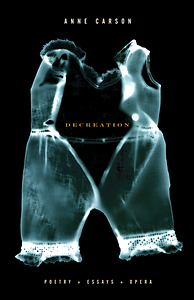Take a photo of a barcode or cover
I'm on a journey to read everything Anne Carson has ever written, and it's really working out for me so far.
So it's a poetry/essay/documentary script/public performance art piece script collection, with many of the seemingly discrete categories woven together by theme or character or turn of phrase, and it's really lovely to see the pieces connect. (I don't think I got all of it, you know, and I'd love to see Anne Carson write an essay on Anne Carson, but that might get too meta-- anyway, even though I sometimes get lost in her arguments or poems (or both as the same thing) her use of language and ability to say something that seems strikingly true, or to draw out nibbling themes from other people and thinkers and connect them all together is just wonderful.)
So you get a bit of Sappho and a bit of Simone Weil, some of Marguerite Porete the nun/thinker/heretic who wrote about her marriage to God in these super sexual terms, and Virginia Woolf, and some more of the Greek and really just this wide net of thought, turned into [flag snapping] and words.
There's also quite a bit on jealousy
a favorite bit (about hunger and food):
"hunger
looks like me
but it is not original with me."
which is connected by theme to this reminiscence on her own childhood:
"In this book the various flowers composing the crowns of the martyrs were so lusciously rendered in words and paint that I had to be restrained from eating the pages. It is interesting to speculate what taste I was expecting from those pages. But maybe the impulse to eat pages isn't about taste. Maybe it's about being placed at the crossing-point of a contradiction, which is a painful place to be and children in their natural wisdom will not consent to stay there, but mystics love it."
And Simone Weil: "Nothing more powerfully or more often reminds us of our physicality than food and the need to eat it. So she creates in her mind a dream of distance where food can be enjoyed perhaps from across the room merely by looking at it, where desire need not end in perishing, where the lover can stay, at the same time, near to and far from the object of her love"
So it's a poetry/essay/documentary script/public performance art piece script collection, with many of the seemingly discrete categories woven together by theme or character or turn of phrase, and it's really lovely to see the pieces connect. (I don't think I got all of it, you know, and I'd love to see Anne Carson write an essay on Anne Carson, but that might get too meta-- anyway, even though I sometimes get lost in her arguments or poems (or both as the same thing) her use of language and ability to say something that seems strikingly true, or to draw out nibbling themes from other people and thinkers and connect them all together is just wonderful.)
So you get a bit of Sappho and a bit of Simone Weil, some of Marguerite Porete the nun/thinker/heretic who wrote about her marriage to God in these super sexual terms, and Virginia Woolf, and some more of the Greek and really just this wide net of thought, turned into [flag snapping] and words.
There's also quite a bit on jealousy
a favorite bit (about hunger and food):
"hunger
looks like me
but it is not original with me."
which is connected by theme to this reminiscence on her own childhood:
"In this book the various flowers composing the crowns of the martyrs were so lusciously rendered in words and paint that I had to be restrained from eating the pages. It is interesting to speculate what taste I was expecting from those pages. But maybe the impulse to eat pages isn't about taste. Maybe it's about being placed at the crossing-point of a contradiction, which is a painful place to be and children in their natural wisdom will not consent to stay there, but mystics love it."
And Simone Weil: "Nothing more powerfully or more often reminds us of our physicality than food and the need to eat it. So she creates in her mind a dream of distance where food can be enjoyed perhaps from across the room merely by looking at it, where desire need not end in perishing, where the lover can stay, at the same time, near to and far from the object of her love"
My fist exposure to Carson, what a fascinating mind. I shall be back for more. Video review https://www.youtube.com/watch?v=WNn3jSR23ZQ&t=39s
reflective
medium-paced
Plot or Character Driven:
N/A
Strong character development:
N/A
Loveable characters:
N/A
Diverse cast of characters:
N/A
Flaws of characters a main focus:
N/A
In this book’s title essay, Decreation: How Women like Sappho, Marguerite Porete and Simone Weil Tell God, the author writes, “I have no idea what this sentence means but it gives me a thrill.”
Girl, me too.
I enjoyed the poems in this collection but I was often left experiencing the sentiment above. That isn’t a lack of an endorsement or even to say I didn’t enjoy them, just that they resonated less with me overall.
The essays and the opera at the close were what really stood out for me. Anne is a wealth of knowledge and it is so absolutely fun, to me, to follow along as she dives into semantics in translation and lesser known histories in essay format. I always appreciate the insights she makes in her essays and her talent of balancing frank observations with delicate musings as she guides us along to that end. In particular in this collection, I enjoyed her explorations of sleep in Homer, as well as the wallop she lands at the close of her essay, Decreation.
“Hephaistos’ Hunger Tango” was possibly my favorite in the collection!
Girl, me too.
I enjoyed the poems in this collection but I was often left experiencing the sentiment above. That isn’t a lack of an endorsement or even to say I didn’t enjoy them, just that they resonated less with me overall.
The essays and the opera at the close were what really stood out for me. Anne is a wealth of knowledge and it is so absolutely fun, to me, to follow along as she dives into semantics in translation and lesser known histories in essay format. I always appreciate the insights she makes in her essays and her talent of balancing frank observations with delicate musings as she guides us along to that end. In particular in this collection, I enjoyed her explorations of sleep in Homer, as well as the wallop she lands at the close of her essay, Decreation.
“Hephaistos’ Hunger Tango” was possibly my favorite in the collection!
challenging
reflective
obviously can't say a thing against her writing, i just didn't fully connect with some parts of this
this was difficult. i saw someone say that their experience reading this was not understanding most of it and still recognizing it as brilliant, which is exactly how i felt about it too! i really took my time because of this, which i think you should definitely do. my favourite part was the decreation essay, close second was every entry is an exit (a praise to sleep)!!!
challenging
reflective
medium-paced
It’s incredibly daunting at times but when you break through what you don’t know to a clear crystallization of feeling or thought, it’s like magic. some of her lines are absolutely perfect. the kind of poetry i could only dream of writing. her intelligence is incredible and i was intrigued by her subjects of analysis as i don’t ever read them on my own. wonderful if you like a challenge or if you are curious about literally everything
challenging
reflective
slow-paced
incredible. we strive for climax but carson shows that it is actually “decreation” we seek. particularly appreciated the Sappho analysis & Weil opera.
slow-paced
"I do not want to be a person. / I want to be unbearable" (72).
This book gave me such a headache. It's unbelievably beautiful and brilliant but, still, headache. I love how Carson will just casually throw in sentences like "Can you make a double negative of light?" and then you have to mull that over and question everything before continuing and promptly stumbling upon another such question. Her essay on "decreation" and Sappho, Marguerite Porete, and Simone Weil's relation to God or the divine is utterly captivating. Carson's essays are all fascinating here, ranging in theme from eclipses and totality to thinking about the liminality of sleep. The in-between content varied in gravity for me; I can see the prowess of what she is doing, but it was difficult to feel invested. Hence, 4 stars.
This book gave me such a headache. It's unbelievably beautiful and brilliant but, still, headache. I love how Carson will just casually throw in sentences like "Can you make a double negative of light?" and then you have to mull that over and question everything before continuing and promptly stumbling upon another such question. Her essay on "decreation" and Sappho, Marguerite Porete, and Simone Weil's relation to God or the divine is utterly captivating. Carson's essays are all fascinating here, ranging in theme from eclipses and totality to thinking about the liminality of sleep. The in-between content varied in gravity for me; I can see the prowess of what she is doing, but it was difficult to feel invested. Hence, 4 stars.







